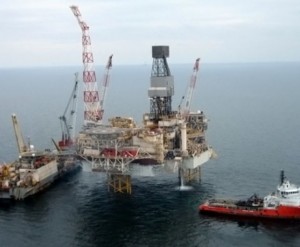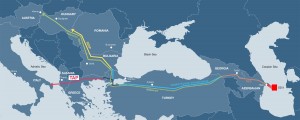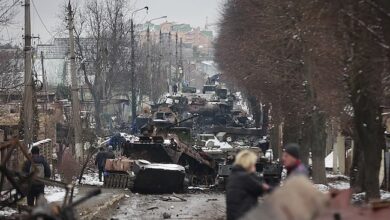
 On December 17, Azerbaijan hosted leaders of several European countries in a grandiose ceremony of signing the final investment pact on the Azerbaijani gas project.
On December 17, Azerbaijan hosted leaders of several European countries in a grandiose ceremony of signing the final investment pact on the Azerbaijani gas project.
Shah Deniz gas field discovered in 1999 (proven reserves: 1.2 trillion cubic meters of gas) is recognized as one of the largest finds in the last two decades. Situated in the Azeri sector of the Caspian Sea, it served Azerbaijan well in its ever-transforming image of a growing energy powerhouse. The gas supplies from the field had already started in the early 2000’s via the South Caucasus Gas Pipeline (also known as Baku-Tbilisi-Erzurum), but the 2nd stage of the project is destined to serve Europe’s both economic and political needs through the direct route into Southern Europe.
Discussions on financial feasibility for Europe has been on the agenda for far too long which is one of the main reasons why the Azerbaijani leadership seems to have finally taken the matter into its own hands. As the negotiations did not lead anywhere, Baku decided to pay the bill for the construction of new pipelines itself. The Trans-Anatolian Pipeline (TANAP) project was initiated by State Oil Company of Azerbaijan Republic (SOCAR) and supported by Azerbaijan’s closest ally Turkey. TANAP will connect with the existing Baku-Tbilisi-Erzurum (BTE) pipeline in the eastern part of Turkey and run the length of the Anatolian peninsula towards the Greek border on the west. There it was bound to meet one two proposed pipelines: Nabucco West (from Greek border through Bulgaria, Romania, Hungary to Austria) or Trans-Adriatic Pipeline (through Greece, Albania to Italy). This summer SOCAR and its international partners chose to go with the latter option.

The decision was made, as claimed by the parties involved, based on the shorter length and commercial viability of the pipeline. Trans-Adriatic Pipeline completed the planned network of the so-called Southern Gas Corridor, although new interconnectors are already being discussed, one of them being construction of a feed to Bulgaria. In the initial stages of the project, Azerbaijan is expected to supply as much as 570 billion cubic feet of gas annually starting 2018-2019.
Azerbaijan’s President Ilham Aliyev told a ceremony in the capital Baku that the project “will change the energy map of our region and help the historical development of our country”. The completion of the alternative gas route to Europe will provide a good alternative to the countries of Europe against the monopoly of Russian supplies. In the recent years, Russian leadership freely played with the tap, shutting down the supplies through Ukraine to Europe, for various reasons, thus causing European consumers to freeze in bitter winters. Kiev’s backpedaling before the Eastern Partnership summit in November is another reason for concern. With Ukraine in Russia’s pocket, Moscow could exert much more pressure on Eastern Europe when and how it wants.
The pact signed in Baku includes an investment decision on Shah Deniz (Stage II), as well as the TANAP and TAP gas pipeline projects. The projects are expected to cost a total of $35 billion.
BP Azerbaijan and the consortium said SOCAR and its partners in Shah Deniz II had agreed to extend terms for the project by 12 years to 2048, Reuters said. The Azerbaijani gas from Shah Deniz field is purchased by Shell, Bulgargas, Gas Natural Fenosa, France’s GDF Suez, Greek DEPA, Germany’s E.ON , Italian Hera Trading, Switzerland’s AXPO and Italy’s Enel.
Source for map: TAP




